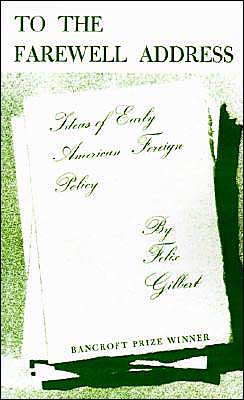

 |

|

The average rating for To the Farewell Address: Ideas of Early American Foreign Policy based on 2 reviews is 4 stars.
Review # 1 was written on 2018-01-22 00:00:00 Jim Davis Jim DavisGilbert is interested in the unfolding of conflicting ideological orientations in the genesis of Federalist and Republican parties during this period. He addresses the role of party conflict in the formulation of guiding principles for American foreign policy. To do this he places ideological debate within the context of partisan struggles over the content of Washington's Farewell Address. Immediately antecedent to discussing the physical genesis of the Farewell Address, Gilbert spends ample time ferreting out the roots of political realism in American thought. These he finds in an American adaptation of the European school of the "doctrine of the interest of states". This 18th century European school of diplomatic thought held that the only principle which could guide a statesman in the formulation of foreign policy was a conception of the nation's "true interest", which in turn rested on the principle of power accumulation through territorial aggrandizement. A "balance of power" was the only way in which to avoid perpetual war in a world naturally characterized by naked power politics. Hamilton, Gilbert points out, had read widely in works of the school of the "doctrine of the interest of states". When it came to writing the Farewell Address, Washington's initial draft had been written with the assistance of the Republican Madison. Hamilton feared that this draft stressed the ideals of Republican government in a manner which could be interpreted as a call for intervention in European wars on the behalf of the French Revolution. America's "true interest'' in the view of Hamilton, and indeed Washington, lay with becoming a power unto itself through an application of the European "doctrine of the two spheres". If the American nation were to become involved at that early stage in European conflict, it would become a mere satellite of a great power. The partisan conflict over who would have a hand in writing the Farewell Address could therefore be seen as a deeper ideological conflict over idealism and realism in American foreign policy. Retaining some of the Republican idealism of Madison's draft, the final version of Washington's Farewell Address is a document which grafts the idealism of American democracy to an enunciation of the European concept of interest politics. As the classic American expression of an 18th century "Political Testament", this document sets the framework for ,the realist/idealist debate in American foreign policy. |
Review # 2 was written on 2016-08-13 00:00:00 Mario Vela Mario VelaI picked this up on a whim at a used book store, and I am so glad I did! It's a concise outline of European and American policy, and how Washington arrived at his concept of foreign policy at the end of his term as president. I now feel like I have a firm grasp on why we were so attached to isolationism at the outset of our government. |
CAN'T FIND WHAT YOU'RE LOOKING FOR? CLICK HERE!!!